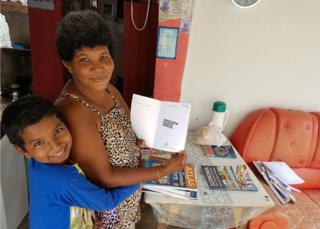‘My 11-year-old son taught me to read’
 Image copyright Renata Moura
Image copyright Renata MouraIt is only been a year since Sandra Maria de Andrade woke up to the wondrous world of reading.
One afternoon after work, the garbage picker from north-eastern Brazil was lying exhausted in a hammock when her youngest son, Damiao Sandriano, invited her to take a look at a book.
"Mum, would you like to read with me?" he asked. "It's a story, and it has pictures."
At the time, the 42-year old was unable to write her own name.
The closest to any formal education she had ever had was a class for young adults in which she was taught the letters of the alphabet.
But she gave up, frustrated at not being able to get past the letter "e". She recalls the experience as "an agony".
It was not until her son stepped in that she would try again.
After a few informal lessons by Damiao at their home on a dirt road in Jardim Progresso, a poor community on the outskirts of the city of Natal, Sandra was able to trace an "e".
Damiao helped his mother how to remember the letters better. The "R", he explained is "like a 'B' but open".
The letter "h" they simply nicknamed "the chair".
Being able to write her own name was a watershed moment. Sandra was able to exchange her old ID which only bore her thumbprint for one with her signature.
"I said: 'I will get myself a new ID to prove that now I know how to write my name'," Sandra told the BBC.
"I went there and they asked me to sign on the paper. I thought: 'There, now I can do it, I don't need to feel ashamed anymore'."
Sandra is one of the 760 millions adults worldwide who, according to Unesco figures, cannot read or write.
In Brazil, there are 12.9 million, making up around 8.3% of the population over 15 years of age.
Sandra was forced to work from an early age after her mother abandoned her when she was three.
After she was taken in by her grandmother she was sent to live with a couple who did not allow her to go to school
She worked on the couple's farm, crushing and grinding cassava for flour and cleaning their house.
One day she was working in a banana field when a group of children walked past carrying notebooks.
"I wanted to go where they were going," she recalls. "But they said: 'Go back to work!'. And I cried."
- How Bolivia combats illiteracy
- Campaign warns 11% of world illiterate
When she was 12, Sandra ran away to try and find her mother.
She managed to track her down but her mother wanted nothing to do with Sandra, and her mother's partner tried to hurt her, Sandra recalls.
Sandra then lived on the streets until she was 13, when she was picked up by a man who offered her food and a roof over her head.
During the time they lived together, they had three children. But it was a life punctuated by regular and brutal beatings.
In 1996, after the man stabbed her and ripped part of her scalp off with his teeth, Sandra took the children and left.
She promised her children that no man would ever hit her again.
Sandra managed to get by picking waste and taking it for recycling.
Without being able to read or write she had to rely on strangers for help with just taking a bus.
"Can you read the sign for me?" she would have to ask them sheepishly at the bus stop.
She said it was a daily humiliation. She never dreamed of having a formal job.
As the years went by she married and had more children before divorcing her husband.
Four of her seven children died when they were still young, three of various disease and one was run over.
Damiao is the youngest of the seven.
One day, after hearing his mother describe the "big shame" of not knowing how to read and write, Damiao, who was three at the time, suggested they make a pact.
"I will learn [how to read and write], and when I do it, I will teach you," he promised.
Damiao had a teacher who helped him with after-school lessons and encouraged him to read books.
Damiao says he loves to read as it takes him "to another world" and gives him "infinite imagination".
Seeing her son come back from school every day is Sandra's pride and joy.
At home, Damiao turns from pupil into teacher.
In the course of the past year, mother and son read 107 books together, some of which she found in the rubbish she picks through for a living.
Her writing is coming on as well. She was thrilled when she signed Damiao's school paperwork for the first time.
"There was a space for me to state my relationship to him. I wrote in very clear in big letters: 'Mother'."
Damiao says his mother can already write "a lot of words", but he wants her to learn more.
"I want her to learn the words she feels inside. She likes to talk about love, emotions," the 11-year old says.
At home, he helped her write a message in green, capital letters on the wall.
It reads: "Little corner of happiness where, thanks to God, nothing is missing."


